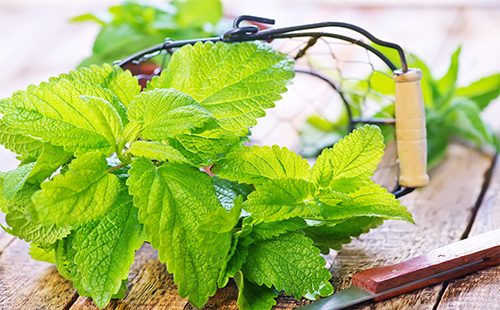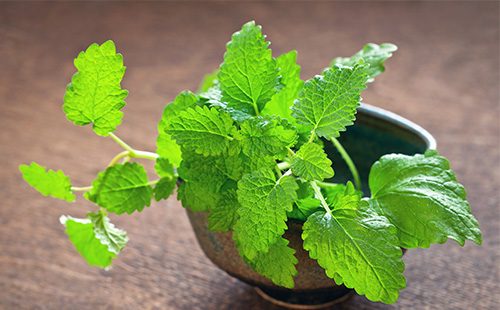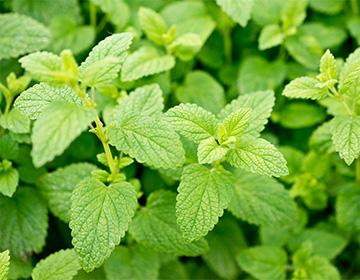The content of the article
Melissa officinalis is a guest from the Mediterranean. From the territory of the Ancient
Rome, where the grass was very revered, migrated to almost all central and eastern European countries. It is found in Russia in the Caucasus, in the European and southern parts of the country. The popular name is lemon mint. Unpretentious to growing conditions, often runs wild. It grows among shrubs, near roads, near dwellings. Because of the pleasant smell, grass is specially planted in the gardens, bred near the arbors.
Botanical characteristic
Refers to herbaceous perennials. It grows by dividing the bush, and therefore quickly forms dense thickets. One of the most valuable qualities is the quick recovery of shoots, so they can be cut several times in one warm season. For home stocks, it is enough to plant only three bushes. You can recognize the culture by morphological characteristics.
- Shoots. Many depart from the underground part. They have four faces, a bluish-green color. Erect, often branch up, which is why they look voluminous. Height under favorable conditions reaches 1.5 m.
- Leaves. Heart-shaped at the base, in shape have an oval or ovoid shape, a serrated edge. They are attached to the stems with shortened petioles. Placed opposite. To the top of the shoot are reduced in size. The color is dark green.
- Flowers. Formed in the axils of the upper leaves. They have a light pink or light purple color, sometimes just white. Flowering is noted in the second year of plant development. It begins in July, lasts until the end of summer.
- Fruit. Represented by four nuts. Their shape is ovoid, color - light brown.
Melissa can be recognized by its rich smell - it is caused by volatile essential oil in the composition. The aroma contains pronounced lemon notes. He is the strongest at the beginning of flowering. Over time, it becomes too cloying, even unpleasant.
Harvesting raw materials
Harvesting can last all summer. The leaves and flowers of the plant are subject to drying. They are collected, timely cutting off the shoots, until all the flowers have opened. Interestingly, the largest amount of essential oil is contained in the first blanks. Raw materials of the third collection contains a minimum amount of volatile components. Under industrial conditions, all three collections of grass are mixed, obtaining a mass with an average content of odorous substances. Home stocks do so.
- Collection. With the help of secateurs or garden shears, they cut the bush, retreating 10-20 cm from the soil. Shake the branches to get rid of insects and dust.
- Training. Sort cut shoots for damaged or dry leaves. Form small ligaments, fastening with twine base.
- Drying. Hang the shoots on a rope in a well-ventilated and shaded area. Leave it until completely dry.It can be dried in a dryer, observing a temperature of not more than 40 ° C.
- Storage. The dried raw materials are threshed. This allows you to separate the flowers and leaves from dense stems. Packed in airtight containers to avoid the loss of essential oil.
Composition
Almost all the therapeutic effects of the plant are due to the content of essential oil in the composition. It revealed about 65 aromatic compounds of the triterpene series. The main ones are:
- myrcene;
- citral in various forms;
- caryophyllene;
- geraniol;
- linalool.
The ether neutralizes most gram-positive bacteria, and is also able to eliminate the viruses of herpes, measles, chickenpox, and influenza. It improves blood circulation and reduces the severity of inflammatory processes. It also stimulates the production of digestive juices, improves the motility of the stomach and intestines, and provides an antispasmodic effect on the digestive organs. Normalizes the processes of synthesis and excretion of bile, urine formation.
Oil has a whole range of effects on the nervous system:
- eliminates anxiety;
- blocks excitation processes;
- normalizes sleep;
- eliminates irritability;
- normalizes vegetative innervation;
- acts as a muscle relaxant;
- lowers blood pressure;
- normalizes the myocardium.
Other valuable compounds
In addition to essential oil, melissa leaves contain tannins, mucus, resins, flavonoids. These compounds normalize blood viscosity, prevent the development of atherosclerosis, regulate metabolism, improve peripheral blood circulation and comprehensively stimulate the immune system.
Especially valuable is the acid composition of the plant:
- ursolic;
- Coffee
- oleanolic;
- rosemary;
- ascorbic.
These compounds enhance the antibacterial and anti-inflammatory properties of the plant, activate the secretory functions of the digestive tract. And also provide antioxidant, cytostatic effects of the plant.

Healing properties
The most powerful are the sedative properties of culture. Herbal preparations are indicated for:
- neurosis;
- irritability;
- chronic fatigue;
- neurasthenia;
- apathy;
- insomnia;
- tendency to cramps;
- digestive disorders on the background of psycho-emotional stress.
Also, herbal remedies are used in the complex treatment of migraines and mental disorders. It is proved that the use of lemon balm essential oil can significantly reduce the dosage of tranquilizers and analeptics. Eliminates grass and dizziness against the background of ischemia of brain cells.
Heart and blood vessels
Galenic preparations from lemon balm are prescribed as part of the complex therapy of hypertension. The plant normalizes heart rate, eliminates tachycardia, optimizes the amplitude of heart contractions. Influencing lipid metabolism, helps in the treatment and prevention of atherosclerosis. Strengthens the walls of blood vessels, eliminates their spasms. The ability of phyto-raw materials to stop heart pains arising from emotional shocks has been proven.
Digestion
Grass improves the synthesis of bile, promotes its excretion, stimulates the appetite and secretion of the digestive glands. Also, the plant normalizes the motility of the stomach and intestines, fights constipation, inflammatory processes on the mucous membranes. Helps with nausea, has an antiemetic effect.
Leather
Extracts from the plant, as well as essential oil, are used in the treatment of infectious and inflammatory skin lesions - acne, acne, infected wounds, boils, dermatitis, trophic ulcers and pressure sores. It is possible to use on undamaged areas - with dislocations, sprains, bruises, joint pains.Also recommended for dental problems, for the treatment of mucous membranes of the oral cavity, with angina and gingivitis. It is prescribed for skin manifestations of allergies, eczema, seborrhea and psoriasis.
Prescription Drugs
In pharmacies, you can find the following forms of lemon balm.
- Essential oil. Used for aromatherapy sessions, preparation of massage compositions, enrichment of cosmetics. There is a practice of internal use for the treatment of neurotic disorders, digestive disorders, therapy and prevention of acute respiratory viral infections.
- Alcohol extractor hood. It is prescribed both orally and externally. It can be used for all indications characteristic of the plant, as well as for immunodeficiencies, nausea due to intoxication.
- Dried grass. Shredded flowers and leaves of a plant. It is sold in various packaging, there is also an option in the form of filter packets. It is considered a good sedative and antispasmodic, it is used for insomnia. Water and alcohol extracts are prepared from dried raw materials at home.
Tea
Features It helps with stress, insomnia and irritability, as well as with abdominal pain of a neurogenic nature. Strengthens the immune system and optimizes digestion.
Preparation and use
- A tablespoon (without slide) of grass is placed in a container for brewing.
- Pour boiling water (200 ml), cover.
- After 15 minutes of infusion, drink, adding a spoonful of honey. The permitted dose is two glasses per day.
Infusion
Features Used externally. The extract is added to the bathtub, washed with wounds, compresses for allergic rash, used for cosmetic purposes.
Preparation and use
- Four tablespoons of raw materials are poured into a thermos.
- Pour grass 0.5 l of boiling water, tightly close the thermos.
- Insist remedy for two hours.
- Filter and apply externally.
Decoction
Features Drink as a sedative and to stimulate appetite.
Preparation and use
- A tablespoon of raw material is poured into a glass of boiling water, mixed, put the container on a slow fire.
- After boiling, heat the hood for another minute.
- 40 minutes insist.
- Filter.
- Take half a glass twice a day.
Tincture
Features Used for hormonal disorders, for the prevention of mood swings in the premenopausal period, from pressure, with exposure to stress and to normalize sleep. Due to the alcohol content, the drug is contraindicated for people suffering from liver diseases.
Preparation and use
- 50 g of dried grass is poured into 150 ml of pure quality vodka.
- Stir, tightly close the container.
- Insist three days.
- Filter.
- Use inside 20 drops three times a day, dissolving in a small amount of water.
Contraindications
Melissa is often prescribed to improve lactation, but in fees. The possibility of its use in pure form to nursing mothers should be agreed with the doctor. During pregnancy, women can also take herbal remedies to eliminate the symptoms of toxicosis, but in small doses and on the recommendation of a doctor. High concentrations of essential oil can provoke a miscarriage. According to the prescription of the pediatrician, the use of grass in children is also acceptable - to improve sleep, relieve anxiety and hyper excitability.
There is a myth about the dangers of lemon balm for men. It is believed that she:
- provokes impotence;
- reduces reproductive function;
- disrupts the process of spermatogenesis;
- inhibits sperm activity.
However, such effects have no scientific justification. Official contraindications of the plant: individual hypersensitivity reactions, as well as the parallel use of other sedatives. An overdose is indicated by lethargy and drowsiness, impaired concentration of attention. With caution, the herbal medicine should be used by persons working with dangerous machinery, as well as the driver.

Reviews
With arrhythmias, it’s a wonderful remedy, I’ve been saving myself without melissa tablets for several times, I brew the solution stronger and drink it in sips. With a cold, brewed lemon balm and mint - great! I have these herbs in both winter and summer.
Love, http://www.ayzdorov.ru/tvtravnik_melissa.php
Melissa grows in our garden. In the heat, water abundantly. In summer and autumn, we collect the grass and dry it; we collect it in a paper box. If melissa and black mountain ash are brewed and drunk together, sweat breaks through so much as if you were sitting in a bathhouse. Collect, dry - the stomach and intestines will be healthy.
Tagir http://www.ayzdorov.ru/tvtravnik_melissa.php
In short, with reasonable use it will be useful. That's all! At least for taste, a pinch of tea in the tea, and the aroma will be incomparable !!! For the sake of this alone it is possible and necessary to apply. And with such an application, naturally there will be no contraindications !!!
Nikolay, https://fitohome.ru/poleznye-svojstva/melissa-poleznye-svojstva.html
Melissa is translated from Greek as a bee. I drink it as a sedative ... I often have nervous breakdowns, I freak out, and I have a lot of melancholy ... I have been suffering from gynecological illness since childhood ... Melissa helps me a lot. Good weed, I advise anyone who has no contraindications to it ...
RB. Sterlitamak city, http://www.mplants.org.ua/view_main_right.php?id=52

